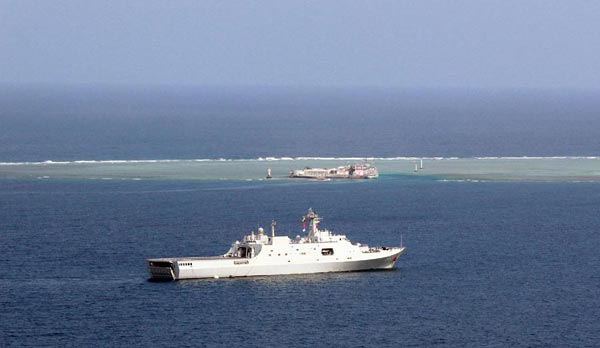US saber-rattling could spark arms buildup, experts say
Updated: 2016-02-19 22:50
By ZHANG YUNB/WANG QINGYUN(chinadaily.com.cn)
|
|||||||||||
 |
|
A formation of the Nanhai Fleet of China's Navy on Saturday finished a three-day patrol of the Nansha islands in the South China Sea. [Photo/Xinhua] |
Experts said that if Washington continues to flex its military muscles in the South China Sea, it may prompt China to boost its defense buildup there to safeguard its lawful rights.
That observation was made in response to a series of incursions US naval warships have made into Chinese territorial waters in the South China Sea in the name of "Freedom of Navigation".
Foreign Ministry spokesman Hong Lei told a daily news conference in Beijing on Friday that the US "has consistently strengthened its military buildup in the South China Sea", and it has lured or pressured its allies or partners to embark on joint military drills or joint patrols in the South China Sea.
"Such actions have worsened the tense situation in the South China Sea and are acts of boosting 'militarization'," Hong said.
Hong made the comments in answer to US State Department spokesman John Kirby's claim on Thursday that Washington sees no indication that China's "militarization effort" has stopped.
Hong added that China has deployed defenses on Yongxing in the Xisha Islands in the South China Sea since 1959.
Jin Canrong, a professor of international relations at Renmin University of China in Beijing, said if Washington continues to flex its military muscle in the South China Sea, "China would be forced to boost its defense capacities there".
"One could conceive of Washington motivating countries to get into a dispute with China to challenge China militarily. That could lead to a security dilemma and a vicious circle in which both sides would race to boost their military buildup," Jin said.
But China would not take such a path, Jin said, because it has been seeking peaceful uses of the construction on the islands there. And in any case, given its overall strengths, China "would still win in the event of such an arms race there".
Ruan Zongze, vice-president of the China Institute of International Studies, said that if the US continues its provocations, China should further fortify its defense facilities there "in accordance with the degree of the threats posed".
"International law gives sovereign states the right to self-preservation and self-defense," Ruan said.
Regarding Southeast Asian countries, Ruan said that "when dealing with the major countries (such as China and the US), they are actually carefully working toward maintaining a certain balance. This effectively serves their interests."
Related Stories
China accuses US of militarizing South China Sea 2016-02-19 21:32
China and Cambodia agree approach to South China Sea issue 2016-02-04 19:05
Sovereignty in South China Sea reaffirmed 2016-01-29 07:54
Ministry dismisses reports international body changed South China sea charts 2016-02-02 16:50
New airfield to boost public service in South China Sea: Chinese official 2016-01-06 20:31
Today's Top News
Tech giants reveal 5G innovations in Barcelona
Mechanism to be built to monitor ceasefire in Syria
London mayor says to support Brexit in EU referendum
What ends Jeb Bush's White House hopes
UK to hold EU referendum on June 23
US saber-rattling could spark arms buildup: experts
Balkan, Austria police agree to register refugees
Turkey blames Kurds, Syria for attack
Hot Topics
Lunar probe , China growth forecasts, Emission rules get tougher, China seen through 'colored lens', International board,
Editor's Picks

|

|

|

|

|

|






